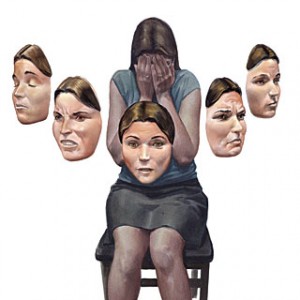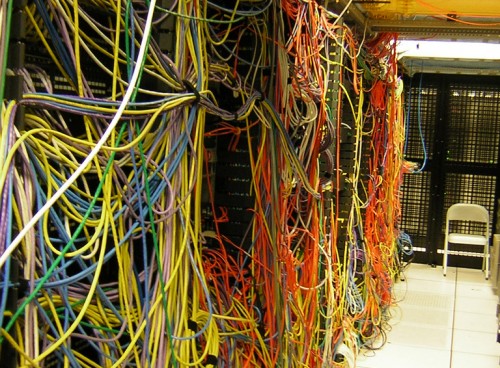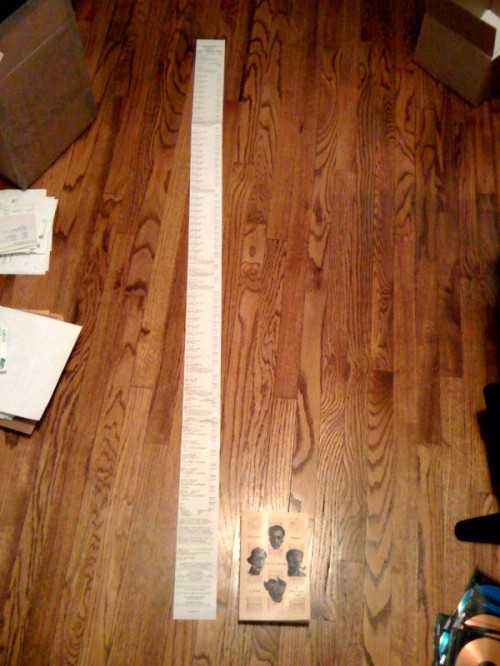But why do the individual stories in a collection have to be connected in any way (tone, character, subject matter, etc)?
TONIGHT IN BROOKLYN: Melville House hosts ‘Publishing In The Age of Blah Blah Blah.’
The five stages of publishing

Hey, writers! Where are you in the publishing process?
Denial: I think maybe I’ll write a novel. I have a really great idea for one. My friends think I’m a pretty good writer. I once got a rejection from The New Yorker that referred to the “obvious merit” of my fiction. Sure. I’ll write a novel and then send it to an agent!
Anger: No one is publishing me because they don’t understand how amazing my work is. They just don’t get it. Philistines. Agents won’t even look at my manuscript. The whole system is corrupt. You have to be one of those New York elites to get a book published. You have to be from money. You have to know people. You have to get an MFA. Publishing is a racket.
Bargaining: What the heck. I’ll go ahead and get an MFA. It might be fun to hang out with a bunch of writers like myself—people just trying to figure out how to get their work out for the world to see. It’ll be fun. I’ll learn some stuff about my craft. Maybe I’ll get into a huge argument in a workshop!
Depression: Even though I have an MFA, Knopf has not yet given me the big, Jonathan Safran Foer-esque, two-book deal. This sucks. Why have I been wasting my time? Publishers are only interested in turning people’s mildly funny conceptual blogs into books. Why the hell didn’t I just take a photo of my cat wearing a monocle, and then ask other people to submit photos of their cats wearing monocles to me? I’d have a book contract right now.
Acceptance: You know, it’s actually surprisingly easy for me to just do this myself. Maybe I’ll just start my own small press.
Unfortunately, making physically nice books will only be a niche within a niche. Publishers are more likely to resort to expedients like selling autographed copies, or editions with the buyer’s picture on the cover.
Thoughts?
We Are All Friends Here

I’ve been thinking about nepotism and croneyism and friends publishing friends because I often hear people talking, complaining, and bitching about the insular nature of (independent) publishing.
Intrapublishing (new word!) happens but not as much as you’d think. Some magazines are largely vanity presses but most are not.
We all know each other, right? We read each other and we publish each other and support each other and love each other and hate each other. It’s a small small community. The longer you stick around, the more inevitable it becomes that you will encounter people you know and/or like (or dislike as the case may be) in your submission queue. Does that influence editorial decisions? Sometimes. If I know you, for example, and you send me a 7,500 word story I will read it but that isn’t a guarantee of publication. Most editors are great people with integrity who can look beyond friendship and/or mutual respect. I get rejected from acquaintances and friends all the time.
The Insertion of Money Where the Mouth Is
TriQuarterly is moving online and/or ceasing publication depending on who you ask. It is a real shame to see such a fine publication being forced into this transition. I’ve noticed a lot of garment rending, lament and outcry, but how many of us subscribe? Every time a small press or magazine announces it’s going to close or is on the verge of closing, the Internet immediately begins frothing about the loss to arts and letters but as someone who works behind the scenes and knows how few of us actually subscribe to literary magazines, I have to wonder about the hypocrisy of it all. People say they can’t subscribe to every journal or that they can’t afford to subscribe or they don’t believe in acquiring things or a wide range of other excuses but still, people really appreciate the work We appreciate your appreciation but we like and need your money more. What magazines are you subscribing to these days? Do we have a right to express our outrage about the “state of publishing” if we’re part of the problem?
James Joyce does not exist

I’ve been thinking a lot lately about books considered legendary, classics, for their language and singularity in time. And then for how those books, over that time, have become books considered timeless and vital to the cause, innovators without which… etc. Joyce, Beckett, Stein, Faulkner, etc. The big names everybody deigns to have read, often via schooling, and who you often hear the more serious critics and often honchos in publishing referring to at large. Seems like I’ve seen or heard of a lot of speech where people in the publishing industry (particularly the larger sections) are talking about their influences and what they like, and many of them referring to these classics, and even if they haven’t said it aloud surely they would not shake their head at the idea that these books are the foundations of how we’ve come to where we are, and etc.
So, then, it becomes confusing to me, in this reckoning, when I think of how most any of these books, if approached today, would not exist. I can’t think of most any publisher, even the major and innovative independents, that would release Ulysses again right now, if instead of an accepted masterpiece, it were a third book by some Irish guy who had published a collection of short fiction and a weird novella. I can’t see even the more edgy presses like Dalkey doing it, or FC2 (EDIT: actually, FC2 recently published Vanessa Place’s La Medusa, which is the closest thing I’ve seen to doing what I’m talking about, which means they might have, maybe), or any of the other countless innovative-based upcroppings. Even the more “languagey” presses often don’t do books that are super-languagey, despite the seeming overwhelming admission that those monsters are the ones that defy time, and sell, perhaps gradually, forever. Maybe it would happen, but it would be a long fight, and a wellspring. I certainly can’t see a major doing it. That kind of freaks me out. Not only in that these works would not exist, but that their influences would not exist either, effectively turning off the power they’ve had in moving things forward over the time they’ve been around.
But those books sold then and sell now (and are curriculum!) for a reason, and part of it is because people since then are being taught not to read what they do not understand. A gradual and stuttered concept that could, over another gradual and stuttered period, be reversed.

